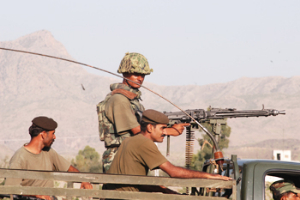Afghanistan-Pakistan Intelligence Cooperation and the Prospect of Peace
By Sudha Ramachandran (06/10/2015 issue of the CACI Analyst)
Pakistan and Afghanistan have signed a landmark deal providing for cooperation between their intelligence agencies. Jointly tackling terrorism is the ostensible aim of the pact. Will it help bring the Taliban to the negotiation table and contribute to Afghan reconciliation or will it trigger a new round of fighting in Afghanistan? The pact’s future is uncertain as it faces fierce resistance in Afghanistan. More importantly, Pakistan has not reciprocated Afghan President Ashraf Ghani’s gestures. Is Ghani’s plan to bring peace to Afghanistan backfiring?

The Prospects of IS in Afghanistan
By Sudha Ramachandran (04/01/2015 issue of the CACI Analyst)
The reported eastward expansion of the Islamic State (IS) into South Asia has set alarm bells ringing as it is expected to inflame the already volatile situation in Afghanistan and Pakistan. There are serious differences between the IS and the Taliban and the latter will put up a strong challenge to the growth of IS in Afghanistan. A sharp increase in violence in the strife-torn country can be expected as the Taliban and the IS battle for Afghan hearts, minds and territory. Importantly, the entry of IS into Afghanistan will impact the peace process.

China's Role in Stabilizing Afghanistan
By Sudha Ramachandran (01/22/2015 issue of the CACI Analyst)
Afghanistan’s President Ashraf Ghani’s recent visit to Beijing was an important milestone in Sino-Afghan relations as it marked the start of China’s enhanced role in Afghanistan, especially as a peacemaker in the war-ravaged country. While Beijing’s close ties with Pakistan will come in handy in dealing with the Taliban, the road to building stability in Afghanistan is littered with landmines. Can Beijing succeed where mightier powers such as the Soviet Union and the United States did not?

The Beginning of Waziristan's Endgame
By Naveed Ahmad (11/11/2014 issue of the CACI Analyst)
Pakistan’s semi-autonomous region of North Waziristan has gone through an unprecedented transformation since June. The Pakistani military has launched an all-out assault on the Taliban Haqqani Group’s hideouts. The Taliban and its foreign collaborators have either escaped to Southern Afghanistan or remain holed up in their havens. The military’s most recent claims put militant fatalities to 910 and its own to 82 officers and soldiers. The fate of the long-awaited military campaign, timed with ISAF’s exit from Afghanistan, is crucial not only for the region but also for international stakeholders in the war-torn nation, who nevertheless have different definitions of “success.”

Afghan Political Settlement Unlikely Before the U.S. Exit
By Mushtaq A. Kaw (09/17/2014 issue of the CACI Analyst)
Alongside the current U.S.-Taliban conflict, the U.S. has unsuccessfully sought reconciliation with the Taliban for a political settlement of the Afghan crisis. Nonetheless, in May 2014, the U.S. swapped five Taliban prisoners for one U.S. soldier to renew the peace process and ensure stability in Afghanistan before the planned exit later this year. However, the prisoner exchange failed to deliver results due to the Taliban’s indifference to dialogue and democratic processes. Consequently, no political settlement for peace in Afghanistan is forthcoming before the U.S. drawdown. A settlement is equally unlikely in its immediate aftermath, which will likely be dominated by rivalries between the Taliban and their competitors.








